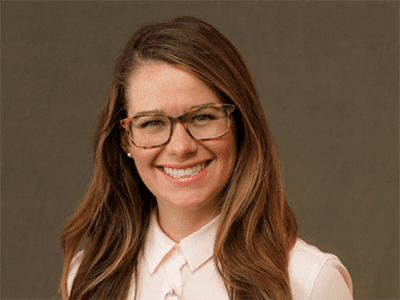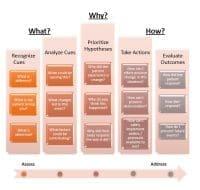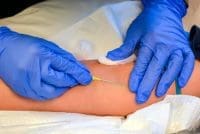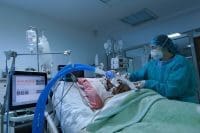“We have to solve the access issues in healthcare. We can’t decrease healthcare disparities if people don’t have access to care…this is a political conversation…we need to have this difficult conversation. Nurses need to be political.”
That was Illinois’ Congresswoman Lauren Underwood’s call to action during her keynote address at the American Academy of Nursing meeting in October 2019 in Washington DC. With nearly 4 million nurses in the United States, nursing is the largest of the healthcare professions and is also lauded as the most trusted profession. But nurses also work outside of healthcare settings and lead research that improves health outcomes, solves public health issues, and shapes health policy that transforms healthcare. Nurses’ position on the frontlines of healthcare makes them particularly well-suited to push healthcare forward, and we see that clearly in places like Illinois, Oregon, Pennsylvania, Hawaii, California, Georgia, Maryland, Arizona, and Minnesota, where nurses are serving in state legislatures. Yet, while nurses’ role in policy has increased, nurses keep struggling to find a voice amidst health policy changes, and they continue to be underrepresented in a matter of politics and policy. Exposing nurses early in their education to work in policy can help shape the health of our nation and beyond.
Changes in healthcare and the complexity of patient care are critical factors that necessitate having nurses’ articulate health policy change. Nurse education, which emphasizes advocacy and clear communication, is an asset for policymaking. For instance, each day nurses translate and communicate complicated medical jargon; anticipate patient needs; and systematically organize, collect, and summarize vital information for various stakeholders. Further, nurses are committed to the caring of people no matter what their cultural or racial background. To help ensure more nurses actively participate in healthcare policy, we must look upstream to create a future generation of nurses who are interested in health policy; innovation is imperative in nursing education.
Integrating policy and education
Currently, nursing programs focus on understanding the care of the patient. Some nursing programs include specific health policy courses in their curriculum. However, coverage of broader health policy issues such as the cost of care or the role health insurance has in the economy are inconsistent across nursing programs. Ensuring that every nursing student gets exposure to health policy is possible by weaving the content throughout the established curriculum or through hybrid models of learning. Early exposure to health policy can help shape nursing students’ interests in local and national healthcare issues
One example is connecting nursing students to case managers during their clinical rotations at hospitals. Nursing students could get paired to a case manager during clinical training. This way, nurses could learn how healthcare is coordinated outside the hospital, discover what influences discharge planning, and understand health insurance issues. Similarly, nursing schools could allow students to choose their final externship at a state or local health department (rather than the hospital). Nursing students could also learn from experience by participating in organizations like the American Nurses Association (ANA), which facilitates nurse contact with local and national health legislation and promotes civic engagement through seminars and lobby days.
Nursing faculty also should help prepare nurses to communicate their expertise with policymakers by using active learning strategies. For example, as part of community health curricula, nurses could draft memos to legislators on local community-based health policies that are of interest to them. Students could discuss in class the critical elements of past congressional hearings. Additionally, faculty could conduct mock interviews to role-play and enhance a student’s ability to discuss health-related matters with the public. An excellent example of a nursing faculty who has successfully integrated active learning strategies for health policy curriculum is Sharon Crowder, PhD. Through “The Eagles” program, she mentors nurses interested in enhancing their leadership and professional development in health policy and advocacy. Dr. Crowder uses mock interviews as a teaching strategy to help students gain practical experience to synthesize and reflect on a policy issue.
Moving forward
For some, the link between nursing and policy may seem tenuous, but nurses need not put their stethoscope aside to take a more active role in policymaking. Integrating more health policy education is a way to help build knowledge and cultivate nurses’ interests in health policy issues. Exposure to health policy may motivate nurses to use their position in healthcare to influence legislation. We must teach the nation’s most bountiful healthcare workforce about engaging meaningfully in healthcare policy conversations. Who better to help healthcare move forward than those who are closest to patients, and whom patients trust the most?
Alison Hernandez is a nurse and current Health and Aging Policy Fellow and a Public Voices Fellow with The OpEd Project.



















4 Comments.
Here in Uganda, majority of the nurses do not even know how to actively participate in policy formation. I am interested in seeing this shift change for the better. I am currently developing a research paper along those lines. I wish we could share some ideas in that regard. Isaac MNS student, Uganda.
Thank you for the encouragement. Though I am a relatively new nurse, continuing in my education RN to MSN bridge program at Grand Canyon University, this is of great interest to me. Nursing education was the initial goal but now it’s leadership and there is such a need for underrepresented minority and socially disadvantaged groups to know how to obtain healthcare and healthcare benefits. It seems only a select few know and understand the resources available. Education of individuals is essential and as a nurse understanding legislation in HC is definitely lacking especially in ADN programs. I plan to look into “The Eagles” program developed Sharon Crowder, Ph.D..
Hi Josie! So glad you found this helpful. I want to champion your interest in policy as a nurse. I would encourage you to join your local nurse organizations (like the American Nurses Association) as they have many ways you can get involved and be civically involved.
Thank you for sharing.